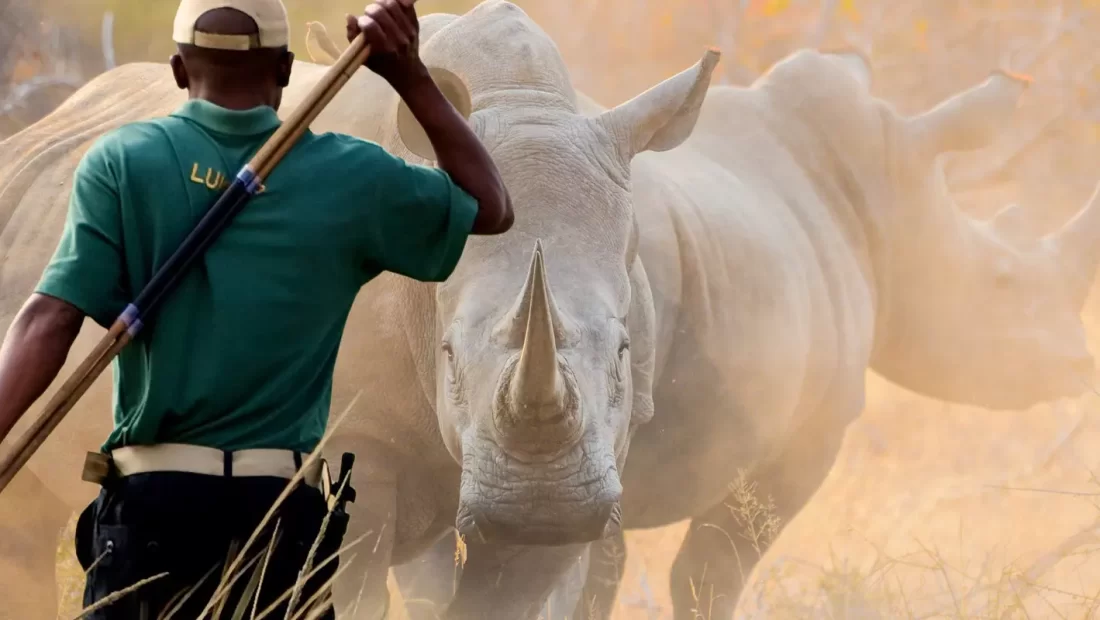
New Narratives `24
Khetha Discussion Forum
NEW NARRATIVES: WEBINAR 01 DISCUSSION
'Wildlife Trade - Do customary rights trump the rule of law?'
In this opening Khetha webinar, now dubbed 'Shades of Grey', we learnt that wildlife crime is complicated and hard to beat. It’s entangled in the very fabric of our society. We must get to grips with its subtleties if we hope to unpick it.
This discussion is based on the Webinar hosted by Rob Inglis of Jive Media Africa, with Lara Rall of WWF South Africa, Vusi Tshabalala from the Kruger2Canyon biosphere region, and Julian Rademeyer the Director at the Global Initiative Against Transnational Organised Crime for East and Southern Africa. He is the author of the bestselling book, Killing for Profit – Exposing the Illegal Rhino Horn Trade.

WEBINAR 01 DISCUSSION
What, for you personally, was one of the key highlights from the opening Khetha webinar and why?
Training the next generation of science graduates, journalists, and conservationists to create an impact on environmental, social, and justice issues in South Africa. If you are interested in partnering with us, please get in touch.
GET IN TOUCH
+27 (0) 83 277 8907
info@rovingreporters.co.za
108 Groom St, Black Rock, Port Edward
Kwa-Zulu Natal, South Africa, 4295
ARCHIVES
Sorted by Month
This site was designed in partnership with




People reacted to this story.
Show comments Hide commentsThe most salient point for me was the idea of how cultural and traditional laws and traditions are a piece in the conservation puzzle. Their efforts although not intentionally aimed at conservation also play a role. My question was how can these efforts be expanded and better aligned with other stakeholders.
The idea that cultural and traditional practices, even unintended, contribute to conservation challenges the traditional top-down approach and opens doors to collaboration and mutual learning.
Good point, Nyameko, re cultural factors. It could make for an interesting and relevant story, too. Any thoughts on on who could be interviewed and what other research could be done in writing a story that explores these dynamics?
What I found most fascinating is the grey area between laws when if comes to hunting/Poaching and how different people interpret these laws so differently…. What i also cannot fathom (being raised in game reserves that were always fenced because of the poaching issues) is the idea that in other countries they have partial to no fencing because there is little to no threat of poaching-if people understand and respect wildlife they can live in harmony with them, and vice versa.
The grey area between legal interpretations and cultural practices surrounding hunting was particularly thought-provoking. For me, this highlights the need for sensitive dialogue and understanding to build bridges and find sustainable solutions. These two areas stand out for their potential to transform conservation efforts by fostering collaboration, respecting cultural heritage, and finding common ground.
I do hope that common ground can be found. What makes it tricky is that there are very different motivations driving people involved. Some want to feed their family while others want to make a quick buck.
One of the key highlights from the opening Khetha webinar for me was the emphasis on the importance of legal legitimacy and community engagement in wildlife conservation efforts. This stood out to me because it highlighted the critical role that perception and acceptance of laws play in ensuring effective conservation practices.
I identified with Lara Rall\’s assertion that illegal behaviour is not always seen as wrong because it lacks perceived legitimacy. It helped me realise that having laws in place is not enough; the communities they govern must also comprehend and accept them. Without this credibility, enforcement actions might encounter opposition or indifference, which would ultimately impede conservation objectives.
The instance of bushmeat being openly sold in Acornhoek served as more evidence of how critical it is to address issues involving disobedience to the law. This blatant violation of wildlife conservation laws reflects a broader challenge faced in South Africa and serves as a stark reminder of the urgent need for improved enforcement mechanisms.
The agreement among panellists that South Africa lacks both legitimacy and enforcement further reinforced the need for concerted efforts to address these shortcomings. This acknowledgement sets the stage for meaningful discussions and collaborative actions aimed at fostering better understanding, acceptance, and enforcement of wildlife conservation laws.
Moving forward, I believe it is crucial to explore strategies to improve community engagement and foster a sense of ownership over conservation efforts. This may involve initiatives to raise awareness, provide education, and promote dialogue between stakeholders. Additionally, implementing innovative enforcement strategies that prioritise fairness and consistency while balancing traditional practices with conservation goals is essential.
Overall, the webinar highlighted the complex challenges inherent in wildlife conservation and underscored the importance of addressing issues of legal legitimacy and community engagement to achieve meaningful and sustainable outcomes.
There are a lot of great points there. Food for thought!
I agree with Nyameko, one of the biggest points of the webinar for me is how indigenous people/local communities are often left out of conservation efforts and discussions, but their traditions are often naturally conserving the environment (just perhaps in different manner than is normally looked at). For example how if your surname is tied to an animal, you won’t hunt that animal. The fact that conservation talks aren’t open to everyone shows how inequality is a big driver of crime, often because of misunderstandings.
For me personally, the key take home highlight of the opening Khetha webinar, was Lara Rall’s comments on how, when laws are seen to lack legitimacy, they are widely flouted. And it was great how she drew the parallel with Covid 19 regulations, which gave us great material for the intro to Maxcine\’s story on the webinar, as below:
Remember lockdown when you couldn’t get alcohol and cigarettes; when you felt trapped in your home? Perhaps it didn’t leave you with a high regard for the law or our lawmakers. Perhaps you felt few qualms getting your hands on booze and baccy any way you could, or breaking curfew when the opportunity arose.
I also relate to Lara’s comment that economic deprivation alone does not provide an adequate explanation as to what leads people to poach or trade illegally in wild animals and plants.
This is a classic quote: “Poverty alone does not drive crime. Countries where you have high overall levels of poverty do not necessarily have higher levels of crime. It’s places that have high levels of income inequality that typically have the highest levels of crime.”
She argues that a breakdown of social norms, a lack of jobs and economic opportunities, especially for the young, as well as corruption, have all played a major role. – Fred K, RR
Yes Fred,
Lara\’s quote on inequality also stood out for me. As did the discussion on the impact of poor relationship between national reserves and communities around them.
I learned that fostering good relationships between the two parties can be of significant help in reducing wildlife crime.
I also agree with Alli and Nyameko. I am of the opinion that one of the drivers of Wildlife crime is excluding opinions and knowledge of the surrounding communities as I believe that for conservation to thrive we do need indigenous knowledge as guidance towards conserving wildlife – Addressing wildlife crime is indeed complex and as emphasized by Lara Rall (one of the panelists ) it needs a good understanding of what is really the driver of this and what enables wildlife Criminal Syndicates to thrive in these areas, she went on to say that a lot of research is needed.
Indeed, Siziwe, addressing wildlife crime is indeed complex, and solutions need to be found that move away from what we could call the \”battlefield syndrome\”, i.e. the \”war\” on poaching. This inevitably results in many people who are essential breadwinners in communities getting killed, causing deeper divisions; as well as the indiscriminate killing of endangered species in protected parks. In the longer term, all this leads to more biodiversity loss as many people who could be part of the solution, are not consulted or involved in ways they benefit and help make a difference.
When you say a lot more research is required, what do you think would be a good starting point, and is there not already a lot of research taking place that could be taken further and cited in stories on this very topic?
What stood out for me was the emphasis on the need for integration of locals into conservation efforts and projects. I learned that some of the communities around the Kruger area do not find laws against hunting to be legitimate.
The benefits of conservation need to also benefit the communities around game parks and reserves if the communities are to actively take part in conservation. This will motivate them better.
Poaching and wildlife trafficking has been a problem for many years. Perhaps its time to consider such constructive approaches.
I completely agree Kemunto.
Without community support, most efforts fail.
When people feel like they \”own the initiative\”, when it becomes personal (they see the direct personal benefit), only then will conservation efforts succeed.
When first watching webinars, I always have my own preconceived notions on what the speakers would say. Admittedly, the comment by Lara Rall surprised me. Articles that I have seen regarding wildlife crime almost always point a finger at poor communities. So to learn that actually there has been a deep dive into the situation and there is a lot more nuance to the situation than one would expect. Looking at income stratification existing in communities in South Africa and its effect on crime rates. The same can be attributed to the greater Kruger area. Vusi shared an interesting point about communities and the local customs. It would be interesting to see in future how reserves are managed with the inclusion of locals.
I liked Lara Rall\’s Covid analogy. It explained a complicated issue in terms we can understand.
Also enjoyed Julian Rademeyer\’s wide-ranging analysis which considers \”almost every aspect of society\” and which drew a link between different forms of organised crime and poaching.